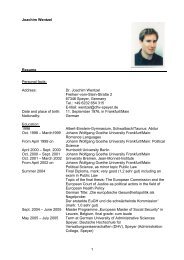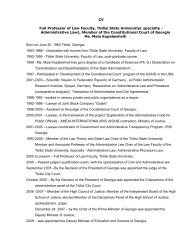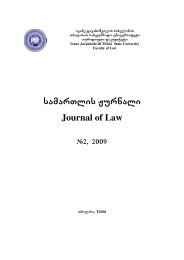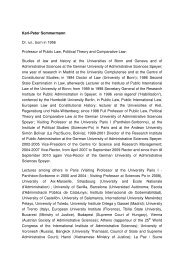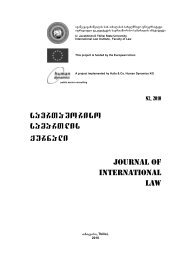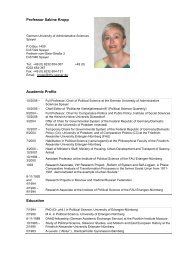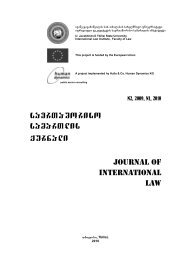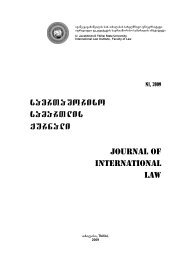Untitled
Untitled
Untitled
You also want an ePaper? Increase the reach of your titles
YUMPU automatically turns print PDFs into web optimized ePapers that Google loves.
saerTaSoriso samarTlis Jurnali, #1, 2008 JOURNAL OF INTERNATIONAL LAW, N1, 2008<br />
tributed decisively to slowing down the proceedings<br />
via groundlessly challenging the reporting<br />
judge on three occasions, as well as<br />
her failures to attend the hearings, and her<br />
refusal to attend for the ... psychiatric examination.<br />
Therefore, no violation of Article 6(1)<br />
was found. 47<br />
It is apt to mention that a State is not responsible<br />
for the protracted proceedings which<br />
were caused due to the applicant even in<br />
those cases, when the latter acts within the<br />
framework of the law.<br />
For instance, in the case Kemmache v.<br />
France the Government argued that the applicant<br />
contributed to prolonged proceedings<br />
due to the seeking the adjournment of the proceedings.<br />
The applicant clarified, that he was<br />
incapable to attend the hearing due to the<br />
psychiatric conditions. The European Court<br />
found, that a State can not be held responsible<br />
for the protracted proceedings, if that was<br />
caused by the applicant. 48<br />
The Strasbourg Court considers and assesses<br />
each stage of the legal proceedings<br />
separately. Respectively, a Government is required<br />
to submit detailed clarifications in respect<br />
with each of the stages of the proceedings.<br />
In particular, in the case Beaumartin v.<br />
France the Court concluded that the applicants<br />
prolonged the proceedings by erroneously<br />
bringing proceedings in the Court which<br />
had no jurisdiction over the case. They also<br />
contributed to the length of the proceedings<br />
by not filing their pleadings until four months<br />
after lodging their appeal. The applicants were<br />
responsible for a certain period of time (9<br />
months), however for the rest of the time no<br />
explanations have been forthcoming from the<br />
Government (the respondent ministry waited<br />
twenty months after the commencement of<br />
proceedings before filing pleadings and the<br />
court dealing with the case took over five<br />
years to hold its first hearing). Respectively,<br />
the Court did not regard as “reasonable” in<br />
this instance a lapse of time of eight years and<br />
four months and therefore found that there<br />
has been a violation of Article 6 para 1. 49<br />
A state can refer to the actions of the applicant<br />
in order to justify its own position; however<br />
this way the state will avoid responsibility<br />
only on the time period which was protracted<br />
due to the acts of the applicant and not with<br />
regard to the entire proceedings.<br />
The analysis of the case law of the European<br />
Court of Human Rights proves that different<br />
standards are established for assessing<br />
the acts of an applicant in civil and criminal<br />
cases.<br />
The requirements with regard to state are<br />
to a large extent stricter in respect with the<br />
criminal cases than with respect of considering<br />
civil cases. This can be explained with the<br />
fact that expeditious and efficient proceedings<br />
in civil cases depends on the initiative and<br />
determination of the parties to a case. Respectively,<br />
the responsibility is to a large extent<br />
shared by the parties to a case.<br />
In the case Ciricosta and Viola v. Italy the<br />
Government submitted that the length of the<br />
proceedings was entirely attributable to the<br />
applicants. In Italy it was “essentially for the<br />
parties to take the initiative with regard to the<br />
progress of civil proceedings” (principio dispositivo).<br />
The European Court shared the view<br />
of the Government and added that the “principio<br />
dispositivo” does not dispense the courts<br />
from ensuring compliance with the requirements<br />
of “a reasonable time“. 50<br />
In civil, as well as in criminal cases, the<br />
courts shall ensure meeting procedural obligations<br />
by the parties through general coordination.<br />
The appropriate legislation shall be<br />
giving to the courts the possibility of exercising<br />
the reasonable control over the parties to<br />
a case. Swift legal proceedings do not fall only<br />
within the interest of the parties to a case. A<br />
state shall itself be interested in considering<br />
each case in a short term, in order to, on the<br />
one hand, avoid the backlogging the courts<br />
and on the other side to save the state resources.<br />
Therefore, a state shall not wait for<br />
the initiatives of parties, but shall establish<br />
such a flexible system which would ensure that<br />
the case is not being continued for long.<br />
One of the problematic issues, which surfaces<br />
in civil cases when assessing the acts<br />
of the applicant, is the actions of the other<br />
party. May state be responsible for that In<br />
this respect the following cases are interesting<br />
to consider:<br />
In the case Vernillo v. France the European<br />
Court established that both parties contributed<br />
to protracting the case proceedings, which was<br />
expressed in the following: the Torzuolis, the<br />
plaintiffs, took four and a half months to reply in<br />
the tribunal de grande instance; they filed their<br />
second set of appeal pleadings three and a half<br />
120




